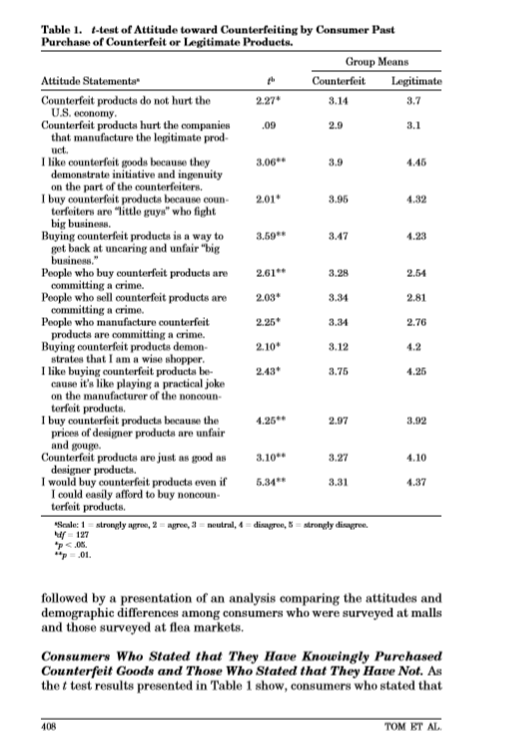Question
A common tenet in the consumer behavior literature, supported by numerous ?ndings (e.g., Ajzen & Fishbein 1977; Lutz, 1975; Yi, 1990) is that attitude in?uences
A common tenet in the consumer behavior literature, supported by numerous ?ndings (e.g., Ajzen & Fishbein 1977; Lutz, 1975; Yi, 1990) is that attitude in?uences consumer choice. Part 1 of the study investigated the extent that the prepurchase variable attitude distinguishes between consumers who do not purchase counterfeit goods from those who do.
Methodology Consumer attitude toward counterfeiting for three different areas was measured with the use of a 5-point Likert-type scale for 13 statements. Two items measured consumer attitude regarding the effect of counterfeiting on the U.S. economy and the economic health of manufacturers of legitimate goods. Consumers who buy counterfeit goods may not realize the economic damage that their activity causes legitimate manufacturers. They may not stop to think that their purchase of counterfeit goods hurts the U.S. economy via job loss, increases in the tradede?cit, et cetera. Nor may they be aware that their contribution to counterfeiting may very well be funding organized crime and other illicitactivities such as prostitution. Three statements were included to determineconsumer attitude concerning the legality of manufacturing, selling, and buying of counterfeit goods. Previous research provides some support that consumerattitude towardthelawfulnessofpurchasingcounterfeit products negatively in?uences consumer intention to purchase counterfeit products(Cordell,etal.,1996;Swinyard,Heikki,&Kau,1990).Five statements were included to assess the extent that consumers participated in counterfeit activities as a method to express their anti-bigbusiness attitudes. Consumers who view big business as charging exorbitant prices to exacerbate snob appeal may buy counterfeit versions ofthelegitimateproducttoexpresstheirnegativeperceptionofbigbusiness. Three statements were designed to determine consumer assessment of the quality of counterfeit goods. Consumers who willingly buy counterfeit products may judge them to be comparabletothelegitimate product more so than consumers who choose not to buy counterfeit goods. The more similar consumers judge products to be, the more similar will be their preference for them (Lefkoff-Hagius & Mason, 1993). A question was included that asked respondents to indicate whether they had ever knowingly purchased counterfeit goods. Respondents were also asked to provide demographic data. Generalizing from previous ?ndings that attitude in?uences consumer behavior, Hypothesis1 teststhevalidityspeci?callytoconsumer purchase of counterfeit goods.
Hypothesis 1: Consumers who have purchased counterfeitproducts hold attitudes more supportive of counterfeitingthan consumerswhohavenotpurchasedcounterfeitgoods.
Participating in the study were 129 consumers, 79 from the mall, where consumers would be unlikely to encountercounterfeitgoods,and 50 from the ?ea market, where consumers would be more likely to ?nd counterfeitgoods(Higgins&Rubin,1986).Researchersapproachedparticipants and asked them to participate in the study by answering a questionnaire.
Result:

Step by Step Solution
There are 3 Steps involved in it
Step: 1

Get Instant Access to Expert-Tailored Solutions
See step-by-step solutions with expert insights and AI powered tools for academic success
Step: 2

Step: 3

Ace Your Homework with AI
Get the answers you need in no time with our AI-driven, step-by-step assistance
Get Started


